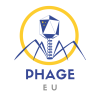PhageEU is a coalition of likeminded stakeholders who represent phages in industry, the scientific community and civil society. We want to realise the full potential of phages in Europe.
Bacteriophages (phages) are the most numerous organisms on the planet. They are everywhere in our environment and our microbiome. They protect animals and humans from bacteria as well as control the number of bacteria in the environment.
Promoting the widespread use of phages will therefore help us to address critical challenges of our time, including Antimicrobial Resistance (AMR), food scarcity and even climate change:
- AMR is a major public health threat which is currently responsible for 33,000 deaths per year in the EU alone and adds an additional €1.5 billion to EU healthcare costs. This figure is forecast to rise to 10 million deaths per year by 2050.
- With a growing population, we will have 10 billion people on the planet by 2050, and we need a way to feed them.
- Greenhouse gas emissions from agricultural production currently account for 11% of GHG emissions and have risen by 14% since 2000.
We need to find a way to produce more food, more sustainably, with the same or fewer resources, whilst at the same time reducing antibiotic use. It is time to ensure that European farmers and European citizens have access to the phage technology that has the potential to allow them to achieve these goals.
In its Farm to Fork strategy, the European Commission has already outlined its ambition to make EU food systems healthier and more environmentally friendly and has adopted an ambitious goal of decreasing the sales of antibiotics by 50% by 2030. In the animal nutrition sector, the Commission also has a declared objective of creating a more sustainable food production system.
Bacteriophage technology can be one part of accelerating the implementation of the OneHealth and Green Deal agendas and the objectives of countering antibiotic resistance, reducing waste, and promoting sustainable production.
With this 2024 European Parliament Elections manifesto we call on all European democratic parties and candidates in the European Elections as well as future members of the College of Commissioners to endorse PhageEU priorities for a healthier Europe. As phage technology is developing, EU decision makers have a unique chance to shape the political and regulatory agenda of the EU, so that the full potential of phages can be used for the benefit of EU citizens and farmers.
PhageEU calls for action
- Recognise the role of bacteriophages in the fight against Antimicrobial Resistance (AMR).
- Recognise the role of bacteriophages in achieving sustainable food systems.
- Develop an appropriate regulatory framework to obtain market authorisation for phage products in the EU.
- Foster innovation and R&D in phage technology
Phage technology is innovative and represents a significant opportunity for animal and human health. Phages are effective at targeting and killing antibiotic resistant bacteria, therefore can be very effective in the ongoing fight against AMR.
In 2023, the great potential of phages was recognised by the European Parliament in its Resolution on EU Action to Combat Antimicrobial Resistance (adopted on 1st June 2023). The European Parliament recognised, that “bacteriophages have considerable potential to become an affordable and effective tool for bacterial control as a potential alternative to or complement for antibiotic therapy”. MEPs have also called on the European Commission to prioritise an appropriate regulatory framework for registering bacteriophages both as feed additives and as veterinary medical products as they have a great potential to fight AMR in animal husbandry.
PhageEU calls to take into account the phage technology in any relevant future non-legislative and legislative initiatives, with the aim to fight AMR, including the future evaluation and revision of the existing animal welfare legislation and the Farm to Fork Strategy.
Phages greatly contribute to the OneHealth approach, while improving animal health and welfare by removing antibiotics from food chain and reducing AMR, as well as increasing environmental sustainability and the economic efficiency of food production.
PhageEU strongly believes, that phages should play their role in achieving fully sustainable food systems in Europe. Phages are contributing to achieving all sustainability objectives of “food system law” as specified by the Commission such as environmental, economic and social.
PhageEU calls to include bacteriophages in any future EU legislative framework for sustainable food systems.
The EU is currently lagging behind many other parts of the world where phage products are increasingly available and recognised as an exciting new category. The authorisation process of innovative medicines and veterinary products in the EU is disproportionately lengthy, burdensome and costly.
PhageEU is calling for an appropriate regulatory framework, in order to facilitate the market authorisation for innovative products in the EU, including phage products. In 2023, the European Medicines Agency made an important step and published its framework for the authorisation of phages as Veterinary Medicinal Products (VMP). PhageEU advocates for development of other frameworks, so that phage products can be registered under different categories and a broad range of phage products can enter the European market. This would be just recognition for the wide range of safe applications for phages, and reward for the significant R&D and Innovation investment currently being made by phage companies, without a current clear commercial pathway.
While phage technology is still in its infancy in the EU, there is a great need to earmark relevant funds at the EU level to support research and development in the phage technology. EU grants should be equally available for any initiatives fostering cooperation between researchers in Europe as well as supporting EU companies in the registration process while financing data collection, trials etc.
